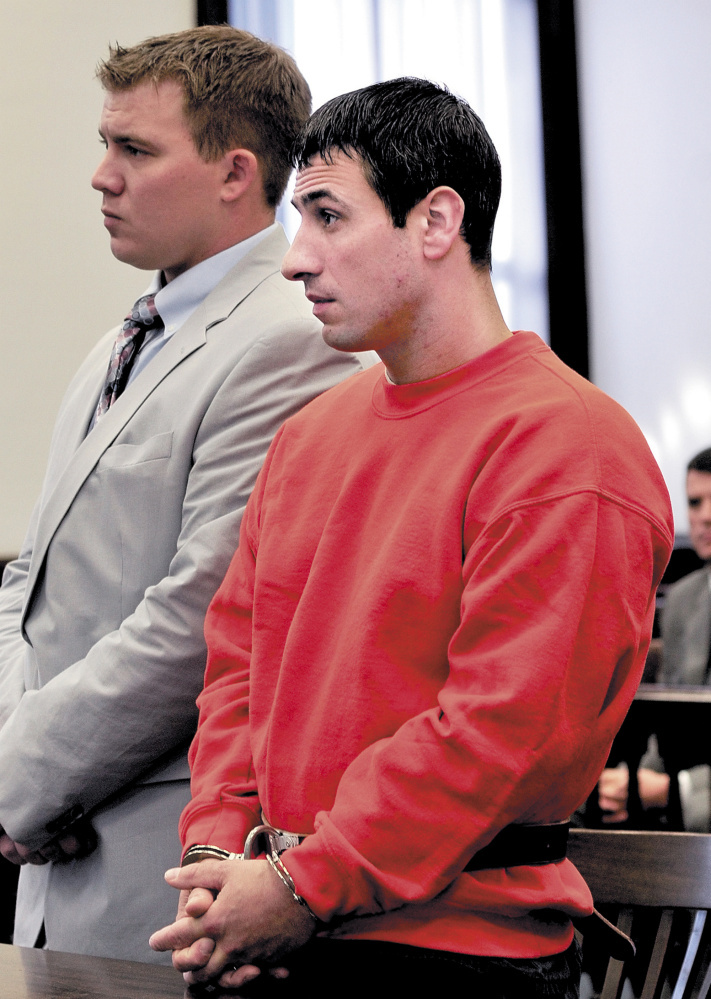A former Detroit man who pleaded guilty to murdering his father in 2011 in the Somerset County town of Cambridge has petitioned a federal court for a new trial or for the court to revisit his guilty plea so he can fight for a lesser sentence.
Angelo Licata, 36, was sentenced in October 2012 to 30 years in prison after pleading guilty to killing 63-year-old Alfred Licata in July 2011. The elder Licata was found dead on a lawn near his home on Ham Hill Road in Cambridge, some 20 miles north of Skowhegan. The Office of the Chief Medical Examiner said the cause of death was blunt force trauma to the head.
This is the third appeal for a reduction in sentence filed by Licata, claiming he did not have effective representation at the time and that his guilty plea was coerced and came without him being provided with details of all of his legal options.
The first appeal to the Maine Supreme Judicial Court was denied in February 2013, according to documents filed Feb. 1 in U.S. District Court in Bangor. A postconviction motion also was denied in Skowhegan court in May 2016.
Now Licata says his court-appointed lawyers in 2012, Frank Griffin and Peter Barnett, along with the prosecutor and even the judge, all “acted recklessly and unprofessionally” with a “prejudice mindset” robbing him of the right to a fair trial as guaranteed under the Sixth Amendment to the U.S. Constitution.
Licata told the court in January 2016, leading up to his first appeal, that his guilty plea was coerced because his lawyers told him that he would get life in prison if he did not accept the state’s offer right away. He says in the new appeal that he never would have pleaded guilty if he had known his defense options.
Licata adds in his new appeal that his Fifth Amendment and Fourteenth Amendment rights also were violated when his defense team failed to produce evidence of his mental and medical disabilities — citing sleep apnea, a potentially serious sleep disorder in which breathing repeatedly stops and starts.
Licata contends in his federal appeal that anger and hostility are among the symptoms of sleep apnea and that his defense lawyers failed to bring his condition to court.
“Sleep apnea is a clearcut and effective way to defend Licata and his action on the day of the incident, for the symptoms carrys (sic) the possibility of loss memory (sic) and outrageous behavior,” according to the federal court documents.
Because the medical evidence was not produced, he says, he did not receive a fair trial and his due process and right to effective counsel were violated. Licata also blames himself for being “ignorant of the law” and for being unaware of what his defense team “was doing to him.”
Defense lawyers said Licata suffered from mental illness and lashed out at his father after years of abuse at the hands of his father.
Assistant Attorney General Donald W. Macomber said in 2016 that both Griffin and Barnett testified the guilty plea was not coerced. They explained to Licata, based on their review of the evidence, that he probably would be convicted of murder after the trial, and the typical sentence for Somerset County murders was in the 40-to-45-year range.
Macomber said the two also testified that they explained that life was the maximum, but it was not likely he would get that.
“They both testified that it was their best judgment that he accept the plea offer, but that the decision was up to him,” Macomber said in an email in 2016 to the Morning Sentinel. “They both testified that he wanted to accept the offer and reaffirmed that a couple of months after the plea and before the sentencing.”
Alfred Licata’s wife, Arlene, told police investigators she heard banging and yelling coming from the first floor of the house the night her husband was killed and found blood all over the kitchen. She dialed 911 from a neighbor’s house and said she saw her son Angelo’s vehicle in the driveway, according to court documents.
Angelo Licata later turned himself in at the Waterville Police Department.
Licata’s lawyers in 2012 said the guilty plea came after state prosecutors agreed to revise the wording of Licata’s charge. Licata also wanted to settle the matter quickly for the sake of his family, his lawyers said at the time.
Griffin, now an assistant district attorney in Somerset County, said at the time that the defense team negotiated with state prosecutors to strike a key phrase from the charge against Licata. The original charge stated Licata’s actions were “knowing and intentional” and that he acted with “depraved indifference.”
Griffin said he and Barnett successfully argued that a person could not be charged with both, so prosecutors removed “knowing and intentional,” which satisfied Licata.
Licata changed his plea from not guilty to guilty before the case could go to trial.
Licata was living in a mobile home in 2011 at 24 Main St. in Detroit, according to court records. It is the same home that Ricky Cole occupied when he was bludgeoned to death inside the home by Jason Cote, of Palmyra, in 2013. Cote was found guilty of murder and was sentenced to 45 years in prison.
Doug Harlow — 612-2367
Twitter:@Doug_Harlow
Send questions/comments to the editors.



